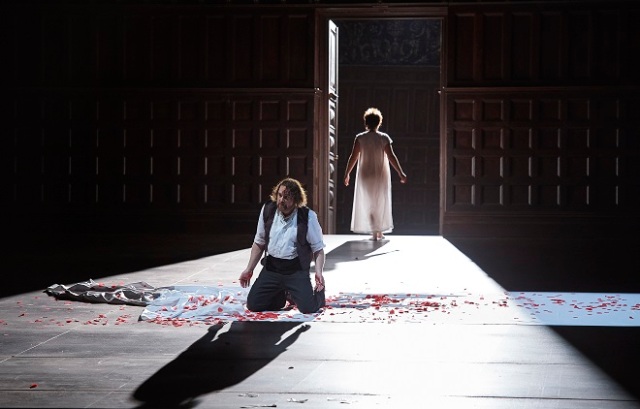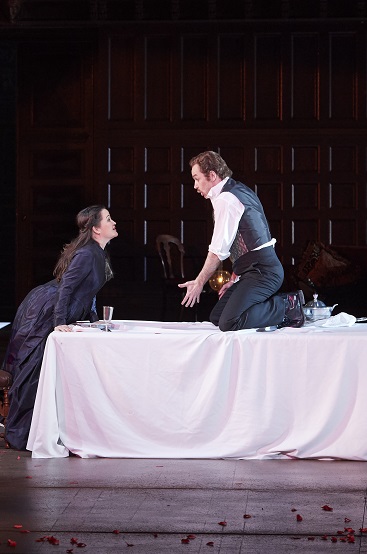I like the Canadian Opera Company’s Rigoletto, directed by Christopher Alden, starring Roland Wood, Anna Christy and Stephen Costello. Everyone I’ve talked to enthuses about the singing.

Anna Christy as Gilda, Roland Wood as Rigoletto (photo: Michael Cooper)
Ah but I like the production, and I say this, aware (via social media) that the reviews I’ve seen uniformly trash Alden. While I get this (where some do their usual refusal to accept anything new, while others are put out that this is quirky and hard to decipher in places), it seems really unfair, when we remember that the opera they want done faithful to the original score is a wooden melodrama full of scenes that make no sense. I’ve been playing this music at the piano since I was a teenager. I watched Louis Quilico sing the role many times, rolling my eyes at his acting even while I adored his singing. The last scene never worked for me, ultimately a question of which high notes would be sung rather than a genuine believable scene. As the years went by he became more and more melodramatic, which I now see makes a lot of sense, considering that the original is truly melodrama. I used to rationalize all this by seeing Rigoletto’s character –and to a lesser extent Monterone & Sparafucile– as evolutionary hybrids, new creatures who didn’t quite fit in with the older bel canto model as exemplified by Gilda & the Duke. And so while some scenes were wooden or hokey I’d lose myself in the wonderful music written for Rigoletto, while glossing over the clunky dramaturgy, the places where Verdi would grind his gears in seeking to make the thing work.
I feel that Alden’s Rigoletto is in some ways ideal, in its striving to get back in touch with the essence of the story, refusing to gloss over what’s really happening.
No one has any real agency. Gilda makes the closest thing to a choice, in offering herself up in place of the skanky Duke she loves, a choice almost totally devoid of nobility because of the foul stench emanating from the person she saves. Her father, a jester who mocked the father of one of the seducer’s victims partly to curry favour with his boss, partly because mockery and abuse were his stock in trade, begins to be fearful contemplating the curse laid up him. And as the disaster looms closer and closer (a father who mocked another father?), we hear him speak of the curse, but in fear. Not guilt mind you, nor remorse.
Fear.
Let me repeat, true to the form of melodrama, this is a world without any real agency, and as such maybe something we have trouble understanding. I love the way Alden’s production refuses to euphemize, takes away all the hiding places. Some of those are surprising, as for instance, when Rigoletto mocks Monterone –that aforementioned father of the girl who was seduced—not by jumping about like a jester (as the mickey—mousing in the score might seem to indicate), but instead by sitting still and abusing Monterone directly, pointedly.
It’s drier and nastier as a result.
Monterone eventually gets it, but in most other productions, that’s something offstage, something we only imagine. Alden gives it to us, complete with a body swaying on the end of a rope. And instead of the quiet Giovanna in the background Alden gets Megan Latham to portray her as an enabler and the Duke’s creepy collaborator, pulling the curtain open and closed even though neither she nor anyone else is really in control.
This production, I repeat, works for me and is one I find more successful than the traditional Rigolettos of my youth. The final scene between Gilda & her father moved me for once. But I was especially shocked by the scene where Gilda goes to the killer Sparafucile, in effect offering herself in place of her lover. Intriguingly, she’s dragged by someone who might be Monterone’s daughter or simply the spirit of all the desperate women who loved the Duke. Perhaps she’s choosing, perhaps she is possessed & haunted. It’s mysterious and poetic and original at the moment of greatest melodrama, when the action is all wild passion. I was shocked to find myself tearing up, and swept away as the music moved me more than it has ever done.

Roland Wood & Anna Christy (photo: Michael Cooper)
Some of that I credit to conductor Stephen Lord’s bravura emotion, erupting from the orchestra at the key moments. But he held the show together magnificently, the COC orchestra sounding strong, agile, and above all, beautiful.
I loved this production when I saw it in 2011 (and I said that I liked it too). But I think I get it more clearly now that I have been reading about melodrama. What I see Alden doing is unwrapping the euphemisms and stripping off the genteel façade that has made this very ugly story palatable for over a century and a half. In so doing he’s marching in step with other opera directors whose updates sharpen the dramatic edge of their shows, for instance Robert Carsen’s Iphigenie en Tauride that we saw here in Toronto at the same time that this Rigoletto first appeared here, or Atom Egoyan’s Salome, which takes an ugly story and makes it even uglier in deconstruction.
Oh my so many references to ugliness: but let me explain. Rigoletto is particularly problematic because the nicest music goes to the nastiest character, the serial seducer who leads a charmed life, while the most sympathetic creature is physically grotesque and morally ambiguous. If this were a Hollywood movie that Duke would eventually get his: but not in this film noir of an opera. Alden makes it that much more exasperating. While Verdi writes happy jocular music for the courtiers when they’re abducting Rigoletto’s daughter, and more happy jocular music when they tell their boss about their clever boys club scheme, Alden doesn’t buy in. When the courtiers show up for the abduction, although the music is all fun fun fun, Alden makes them very creepy, very scary. I love that moment. And while Verdi wrote something especially bizarre to open Act III (because of the two part aria convention, the Duke has an abrupt change of heart and manner), Alden with the help of newspapers, conjures something hysterically funny, in the chorus’s response. It’s a melodrama, like a clockwork machine that inexorably runs without remorse to its conclusion. At times it resembles the dark comedy one glimpses in Hitchcock.

Anna Christy and Stephen Costello (photo: Michael Cooper)
On this occasion, we had an announcement that Stephen Costello was unwell yet he finished the performance. There was one high note that had a tiny bit of a crack, confirming his condition (although the omission of a few high notes also served as de facto evidence); even so he was heroic, singing boldly and with a wonderfully Italianate flair. Christy was highly sympathetic in what can be a thankless role, while Wood was especially strong dramatically and vocally.
But there is no tragedy, just sadness here in this strange space, that I called “a man’s world” back in 2011, resembling a kind of men’s club. All are forgiven, none can be blamed in a microcosm that’s so relentless. I can see that some found it unsympathetic as though we’re watching rats in a Skinner Box. No it’s not nice, but then again: neither is Verdi’s opera.
Finally, I offer something to help get inside the world of Alden’s Rigoletto, courtesy of Jessica Chastain & Saturday Night Live. We seem to be in a world with some resemblance to Rigoletto’s world, a world where the rules are different for people like the Duke of Mantua, or the POTUS. When you watch the news and the most outrageous behaviours seem to have no consequence, no logical outcome, and you’re asking yourself “what even matters”? Perhaps one should accept that you have no agency, that there’s nothing you can do.

Mr Costello did not finish the performance… he was replaced in the third act by the scheduled second tenor.
Really? The public announcement stated that Costello was unwell but would continue to sing. Please tell me where you got your info.
Hi Leslie,
After the announcement, Stephen Costello sang all of Act II. After the scene change, when the curtain opened for the beginning of Act III, it was Joshua Guerrero on stage, who then sang the rest of the opera to the end, and took the bow.
Wonderful singing from both men.
-Virginia
Aha…. I got confirmation of this from a cast member. But there was no announcement. I wish we’d been given more info.
THANKS VERY MUCH for your input.
…And thanks Virginia.
well, smell you.
Okay it’s not spam, so I published this.
I too found the production had grown on me and I know think it’s strong and insightful. Not all the reviews “trashed it”!
Thanks for letting me know.